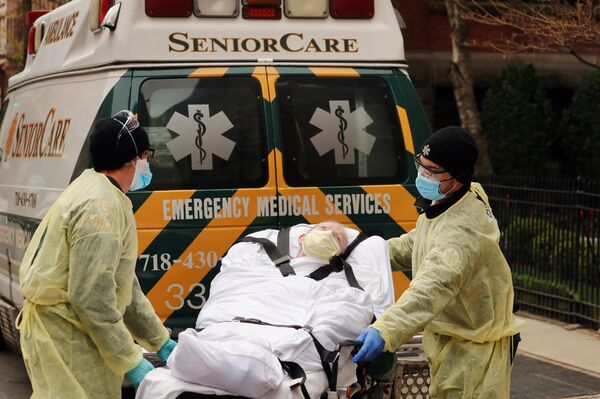Missouri became the first American state to sue the People's Republic of China, its leadership, and its ministries over what it called a "sinister campaign of malfeasance and deception" of which the "COVID-19 pandemic is the direct result", according to the plaintiff. The civil action seeks to hold the Chinese "accountable" and allow Missouri "to recoup billions of dollars lost as a result of Defendants’ actions and inactions". Mississippi followed suit on Wednesday with Attorney General Lynn Fitch announcing that he would seek damages under the Foreign Sovereign Immunities Act (FSIA) in a legal bid similar to that filed by his Missouri counterpart.
There is no precedent for holding a state accountable for a pandemic or disaster, says retired UN Independent Expert on the Promotion of a Democratic and Equitable International Order Alfred-Maurice de Zayas. He alleges that were China held responsible for COVID-19 this could have triggered similar cases with regard to past instances of infections and contamination spread including, in particular, Washington's handling of the H1N1 pandemic that was first detected in the US, infected up to 1.4 billion people and claimed the lives of 575,400 worldwide according to some estimates.
Sputnik: What's your take on Missouri and Mississippi's lawsuits? Were there any similar precedents in the past? What repercussions may it have, in your opinion?
Alfred de Zayas: The Attorney General of Missouri probably does not know much international law or the articles on State Responsibility prepared by the International Law Commission. The case is a non-starter – both on the facts and on the law. However, the Missouri suit plays into the fake news and disinformation campaign launched by Trump as part of his re-election strategy.
There is no precedent for suing a State in connection with responsibility for a pandemic. Litigation is not the solution to a pandemic. Prevention and preparedness would have been. Of course, we could go back to historical cases of pandemics that originated in the United States, like the N1H1 pandemic in 2009 or the so-called "Spanish flu" of 1918/19 that many think originated in Kansas. Some think that HIV/AIDS originated in the Congo or in Haiti, but the real pandemic started in California in the 1980's.
If the US thinks that China should be held responsible for allegedly not sounding the COVID alarm earlier, then maybe the rest of the world should consider holding the US responsible for dragging the globe into the 1929 depression or for the 2007/08 meltdown that again cost millions of jobs and misery and led to countless suicides across the globe?
More relevant would be a study on the consequences of reckless state action that negatively impacts the health and economies of other countries. Classical example is the Fukushima disaster in Japan. The world, however, demonstrated solidarity with Japan and did not come with a lawsuit claiming trillions.
Even more relevant would be a study of the health impacts of the use of illegal or indiscriminate weapons in war, in particular in aggressive wars, e.g. the use by the United States of agent orange and white phosphorus in Vietnam and Iraq, depleted uranium weapons in Yugoslavia, Afghanistan, and Iraq. These weapons have left a trail of tens of thousands of cancers. The US has not been sued for compensation.

Sputnik: Why is the Trump administration voicing suspicions that the virus originated from the Wuhan Institute of Virology (WIV) and urging China to grant an American delegation access to the WIV laboratories?
Alfred de Zayas: Trump is a populist by nature, but not a very convincing one. There is zero evidence, not even a beginning of a "piste" to follow. Just a cheap conspiracy theory that smacks of xenophobia and "hate speech" against the Chinese and other Asians.
The US has already instrumentalised human rights to defame all geopolitical and geo-economic rivals. The weaponisation of human rights against Cuba, Nicaragua, and Venezuela is particularly obscene because these countries have more successfully dealt with health issues than the United States. Sanctions are aimed at destroying their infrastructures and making it difficult if not impossible to obtain medicines or medical equipment. I explain this in my report to the HR Council A/HRC/39/43/Add.1.
Sputnik: How may scaremongering and scapegoating of particular countries affect the world's capabilities of identifying, containing, and tackling epidemics and pandemics? What are the main COVID and post-COVID priorities for the US and other countries, in your opinion?
Alfred de Zayas: The blaming game is a political manoeuvre so as not to have to discuss the fact that the United States was woefully unprepared to deal with this emergency. US politicians have gone out of their way to defund public health, close hospitals and otherwise privatise the health sector. That means that if a clinic or hospital is not making a profit – it is simply closed. And when an emergency hits there are not enough hospitals, not enough beds, not enough intensive care possibilities.
The United States electorate has an opportunity to vote out politicians who have engaged in this game. Alas, they come from both parties. Both Republicans and Democrats are committed (sold out) to Wall Street, the military-industrial complex, big business, and the pharma industry.
The countries whose economies have been weakened by US economic war, financial blockades and sanctions, countries like Cuba, Nicaragua, Venezuela, Syria, Iran - these countries should bring the matter before the General Assembly with a view to adopting a resolution under article 96 of the Charter that would elevate the legal questions to the International Court of Justice for an advisory opinion. I would suggest the establishment of a Peoples Tribunal on Sanctions and COVID – something similar to the Bertrand Russell Tribunal during the criminal Vietnam War.


